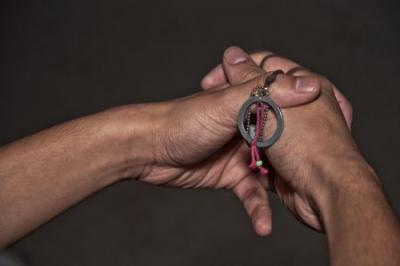
This necklace from his family means everything to Martin. (Kel Harris/El Nuevo Tennessean)
Daniel A., 32, moved from Honduras to East Tennessee almost four years ago. His family in Honduras accepts the money order he mails every other week instead of seeing their son. His parents were sad to watch their son leave their country, but Daniel knew he could provide a better life for his family if he moved to the United States.
Now, as a server in a restaurant in Savannah, Daniel works for tips and shares a small living space with his cousin. Coming to America was an emotional strain for him. He had to leave his family, and did not know anyone in the states at the time. Although he loves everything that the United States has to offer and has made friends here, Daniel still finds himself longing to be with his family.
“I moved here for a dream of freedom and prosperity for me and my family because American money is much better than my country’s,” he said. The uncertainty of ever seeing his family again is the difficult part.
Daniel’s is one of many families divided by borders. T.H. Gindling and Sara Poggio researched the effects of family separation on school-age children. In their 2009 report, “Family Separation and the Educational Success of Immigrant Children,“ Gindling and Poggio found that 44.5 percent of Hispanic children in the U.S. were separated from their parents in 2003. They also found it common for families to become separated when parents migrate to the United States – either leaving their children behind or having their children migrate when they are older.
In some cases, immigrants leave their children in the United States as they move back to their home country. This is the case with “Martin’s” family (not his real name).
Martin’s parents say they have seen everything that the United States has to offer, and they are not satisfied. The family, originally from Pacaya, Guatemala, first came to East Tennessee after civil war broke out in their country and spread to the small towns and rural areas.
After more than 20 years of living in the United States, Martin, 25, said he barely remembers what his grandparents look like. He remembers them through photographs and the brief weeks they had spent together. Martin tried to persuade his parents and brother, who are adamant about returning to Guatemala, that America is where their opportunities lie. However, they say family and heritage are more important.
“That is their home,” said Martin. “Honestly, any person can move far away from where they grew up but there is never a replacement from where your true home is. That’s where all their family is. Everyone that they’re related to is there, and it’s a much happier place.”
In 2007, the family traveled back to Guatemala to spend time with relatives. This was the first time that Martin had met his grandparents and other family members. On this trip, his parents came to the conclusion that they wanted to leave the United States behind for a more simple life. Martin does not agree; he does not want to abandon American luxuries and, more importantly, the country.
“This is my home; I grew up here,” said Martin. “Sure, all my family is there … but I have no true emotional ties to them because growing up across borders made it hard to have any type of relationship with my family members. All I can ever really remember is the sounds of their voices from static phone calls.”
Kayla Bowker, 23, is also of Guatemalan descent and lives in East Tennessee. An American family adopted her as an infant. She has lived her entire life separated from her biological mother in Guatemala. As Bowker grew older, she became more curious about her heritage and any family still living in Guatemala.
“It brings an element of curiosity, questioning and even disconnect,” said Bowker. “I associate myself as Guatemalan and I appreciate the Guatemalan culture more because it is about family and pride in oneself. I would love to go back to Guatemala. I know it would be very emotional because I would want to find my birth mother.”
Bowker has plans to visit Guatemala, possibly within the next year.
Meanwhile, Martin chooses to live at home with his parents until they move back to Guatemala. He wants to spend every moment that he can with them now because he will not have the same opportunity when they are separated by borders.
“It’s going to be hard to live without my parents here when they move, and I would move there but I know I would be unhappy,” he said. “I will admit, it [Guatemala] is a happier place with a peaceful way of life, but some of the people I have here are replacements for family that I have never had, so I could never leave that.”
_____
Editor’s note: This story was previously published on El Nuevo Tennessean

